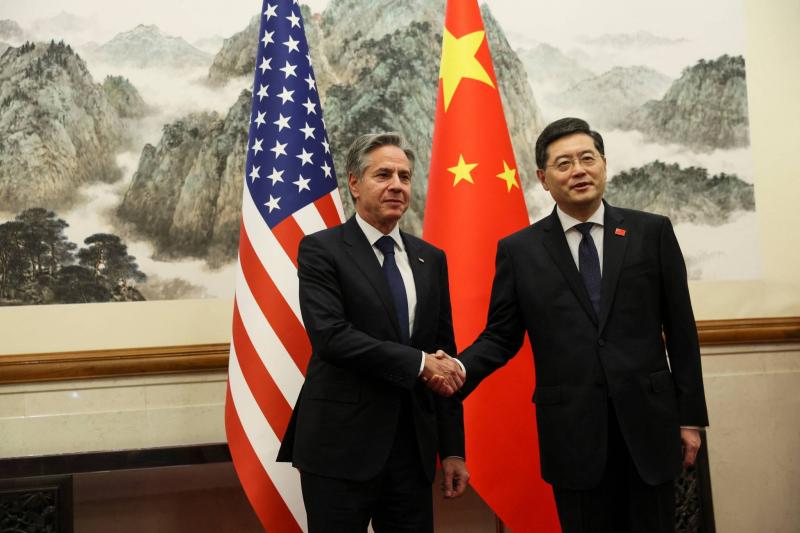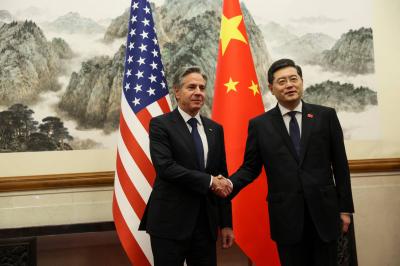China and the United States agreed today, Monday, to achieve stability in their fierce competition to prevent it from turning into conflict, but they failed to make any significant breakthrough during a rare visit by U.S. Secretary of State Antony Blinken to Beijing. Chinese President Xi Jinping welcomed the "progress" after shaking hands with Blinken in the Great Hall of the People, which is typically reserved for receiving heads of state.
Both Blinken and Xi stressed the importance of having more stable relations between the two countries, as any conflict between the largest economies in the world could lead to global disruptions. However, China rejected Washington's proposal to resume military communication channels, indicating that U.S. sanctions are an obstacle to this step. Each side appeared to maintain its position on all issues ranging from Taiwan to trade, including U.S. measures targeting the Chinese chip industry, human rights, and the Russia-Ukraine war.
U.S. President Joe Biden described U.S.-China relations as on the right track. White House spokesperson Karine Jean-Pierre stated that Blinken's public message emphasized the importance of keeping open channels of communication to mitigate risks, and that the meeting was a "step forward."
During one of the most significant communications between the U.S. and China since President Biden took office, it remained unclear how the countries would overcome their differences, but they agreed to continue diplomatic communications with more visits in the coming weeks and months. At a press conference concluding his two-day visit to Beijing, the first by a U.S. Secretary of State since 2018, Blinken stated that Washington achieved its goals for the visit, including expressing its concerns directly, attempting to open dialogue channels, and exploring areas for cooperation.
Blinken noted, "Relations were in a phase of instability, and both sides acknowledged the need to work on stabilizing them." He added, "But making progress is difficult and takes time. It is not the result of one visit or trip or conversation. I hope and expect that communication between us will improve in the next phase." Xi told Blinken at a long table adorned with pink lotus flowers, "Both sides have also made progress and reached agreements on some specific issues. This is very good."
Blinken responded by saying that both countries are responsible for managing their relations. He mentioned that his meetings in Beijing, including talks with top Chinese diplomat Wang Yi and Foreign Minister Qin Gang, were "candid and constructive." It was unclear from Xi's statements what progress he was referring to, but he informed Blinken that China "wants to see relations based on a sound and stable foundation between China and the United States" and believes that both countries "can overcome various difficulties," according to a Chinese statement on the talks. He also urged the U.S. not to "harm China's rights and legitimate interests," referring to points of tension such as Taiwan, the democratic island that Beijing claims as its territory.
Blinken stated that he made it clear that the U.S. needs significantly more cooperation from China to stop the flow of fentanyl and that both sides agreed to establish a working group on this issue. The U.S. State Department stated that Blinken raised contentious issues such as Taiwan, human rights, provocations from North Korea, and U.S. concerns regarding China's intelligence activities in Cuba.
U.S. officials downplayed the likelihood of a significant breakthrough in the discussions but expressed hopes that Blinken's visit could pave the way for more bilateral meetings in the coming months, including potential visits by Treasury Secretary Janet Yellen and Commerce Secretary Gina Raimondo. The last meeting between Biden and Xi took place at the G20 summit in Bali, Indonesia, in November, where they pledged to maintain further communications, but relations have deteriorated since then due to issues related to Taiwan, espionage accusations, and other concerns.
**Taiwan: A Core Issue**
The absence of communication channels between the two countries has raised concerns globally, with China's neighbors anxious over Beijing's refusal to engage in periodic military talks with Washington. Senior Chinese Foreign Ministry official Yang Tao told reporters after the talks that U.S. sanctions are preventing improved communications between the two militaries. Chinese Defense Minister Li Shangfu, who took office in March, has been under sanctions since 2018 over the purchase of fighter jets and equipment from Rosoboronexport, Russia's largest arms exporter.
In response to a question about whether the two sides made specific progress, Yang stated that they agreed to prevent the relationship from slipping into a bottomless pit. He also added that Chinese Foreign Minister Qin accepted Blinken's invitation to visit the United States. Beijing's tone regarding Taiwan was assertive during Blinken's visit, with Wang stating, "There is no room for China to compromise or make concessions."




